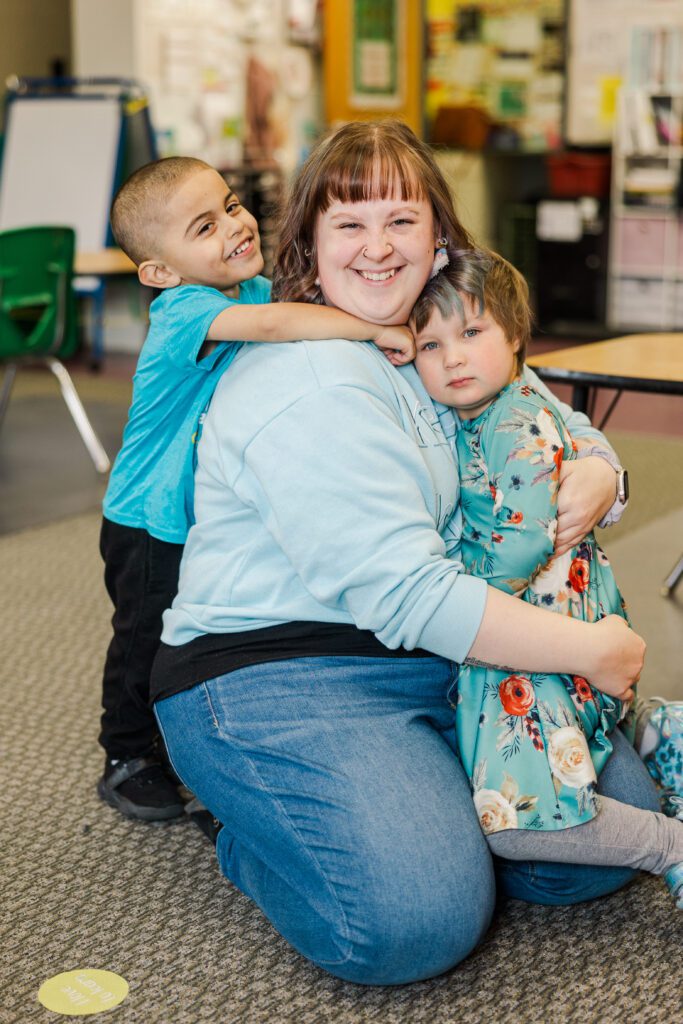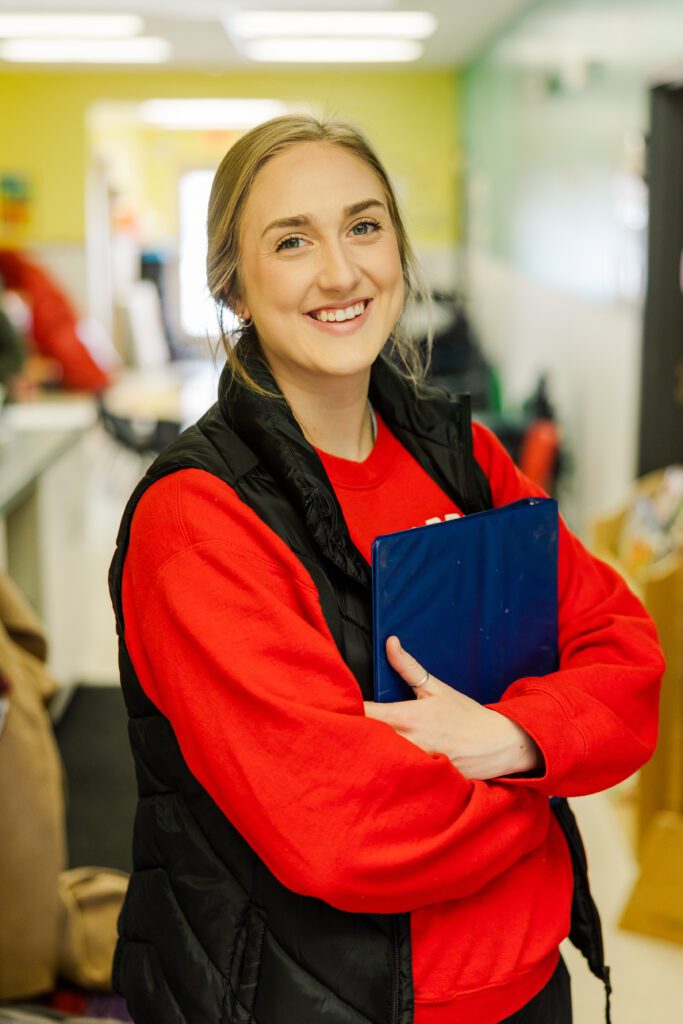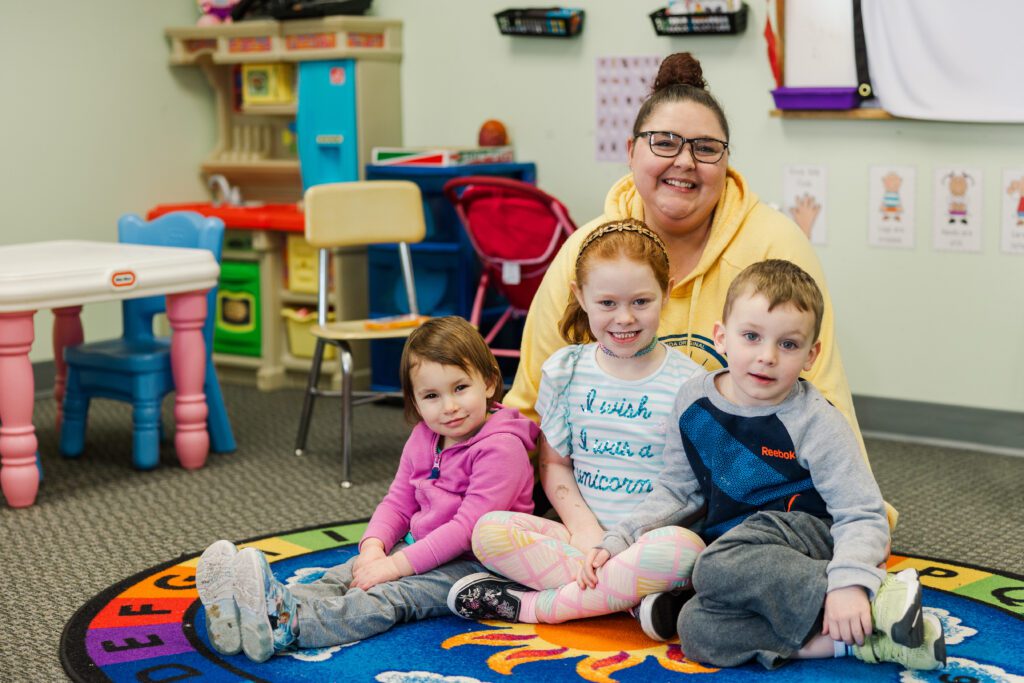It’s mid-morning at the Learning Funhouse child care center in Bird Island. Miss Grace encourages the preschoolers to listen to a book she’s reading. After the story ends, they play with dinosaurs, try to wait their turn, get hugs and reminders to share space with friends. Meanwhile, the toddlers are driving toy tractors around the carpet in the room next door. And in the infant room, it’s time for a bottle. To Mark Glesener, president of the Learning Funhouse nonprofit board, the daily activity reminds him of a town.

“It’s just like a little community, with small children running around, going about their business. It’s fun to see the community that’s developed within the center,” said Mark, a retired local business owner. “The Learning Funhouse is essential. All of our young families use it. Grandparents use it for their grandkids. It’s just such a vital resource to the town. I don’t know what the folks would do without it.”
Founded in 1999, the Learning Funhouse serves families from all over Renville County. It’s a unique public/private partnership with strong support. It was started as a nonprofit by 25 Bird Island individuals and businesses. After several years, initial funding and grants couldn’t sustain the center, and the City of Bird Island stepped in to assume the facility’s mortgage, leasing the building back to Learning Funhouse.
In 2017, a building was added to accommodate the growing program, which is housed on Main Street in Bird Island. That project was facilitated through a $26,000 grant from the Southwest Initiative Foundation (SWIF) plus a $41,000 loan from the Renville County EDA. The new space allowed room to focus on activities that engaged school age children.
Kids and families continue to rely on the Learning Funhouse for child care, even as center staff face challenges to staying open — hosting fundraisers to supplement what family tuition covers, searching for staff and trying to bring up numbers. Licensed for 72 kids, attendance is 30 to 40 on any given day. The toddler room is full. The infant room has a waitlist stretching out to 2024. But preschool and school age care is down.
“In the good days four or five years ago, we were busting at the seams. COVID dropped the census by half. It has just knocked the socks right off the center, with having to close a number of days and staff being absent,” said Mark, adding that rising tuition has been hard for families.
Baylie Kubesh stepped into her role as the center’s director during the pandemic and has been with the Learning Funhouse for two years. She’s a graduate of the local BOLD High School where she now coaches girls basketball and volleyball. Baylie loves working with kids of all ages, and in her coaching role helped the girls take second at this year’s Minnesota State Class A Girls Basketball Tournament.

“I’ve always been involved in youth programs. Growing up, I was a babysitter. I’m with kids 24/7 now,” Baylie said, referencing her multiple coaching jobs on top of child care.
Baylie and her staff teach the kids at Learning Funhouse about community, health and nutrition, creativity through play, and what it means to help others. They help children develop friendships and learn responsibility and the importance of individuality. Finding, certifying and keeping staff to fill this essential role poses challenges.
“We’ve seen more high schoolers applying, which is great. But then they’re not teacher qualified most times,” Baylie said.
SWIF helps fund professional development opportunities for rural child care providers as part of our broader work to support child care. We are also helping plan and invest in local child care projects, and ensuring leaders and communities are equipped and supported to right-size child care related work for local needs.
Alongside Bird Island and other rural Renville County communities, SWIF participated in the First Children’s Finance Rural Child Care Innovation Program (RCCIP) over a two-year period.
RCCIP is a community engagement process designed to address the challenges of child care in rural areas. It’s based on the fundamental idea that rural communities are greater than their size in numbers and greater than their current challenges.
The Renville County child care needs assessment conducted in June 2020 by First Children’s Finance showed the county’s capacity for child care meets only 76 percent of the child care need; the county is 154 child care openings short of full capacity.

“We have towns and communities that have no daycare at all in Renville County,” said Mark, who was part of the Renville County RCCIP cohort. “The story is if you have to go over to the next town to get daycare, pretty soon you’re shopping in that town, and then your kids are going to school in that town and then you’re moving to that town.”
Through the RCCIP, Renville County identified seven goals to address child care challenges. The goals included an inclusive marketing plan that provides opportunities for providers to engage with each other and their communities as well as encourage development of new providers. SWIF provided grant funding to support this and other goals listed in the Renville County Community Solutions Action Plan.
“Child care continues to be the biggest economic mobility issue in southwest Minnesota, and one of our priorities is investing in our region’s child care professionals. We are grateful for the impact that these amazing educators and leaders are having on our children, their families and the employers throughout our region.”
Southwest Initiative Foundation President Scott Marquardt
While the formal RCCIP cohort has concluded in Renville County, a countywide group still meets to talk about ongoing solutions. Additional RCCIP cohorts in our region include Hutchinson, Montevideo, Ortonville, Lower Sioux Indian Community, Kandiyohi County, Meeker County and Renville County.
“SWIF has been very supportive and that’s helpful,” Mark said, adding that the child care crisis “urgently needs to be addressed.”
Quality, affordable child care is essential for a strong economy and vibrant communities. In fiscal year 2023, SWIF leveraged more than $685,000 to support child care in our region.



